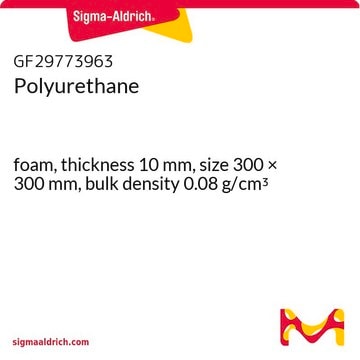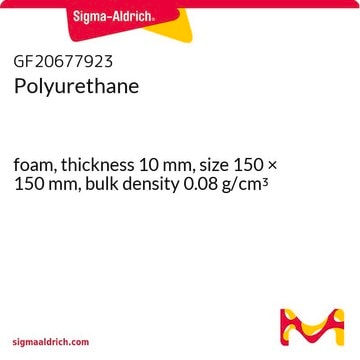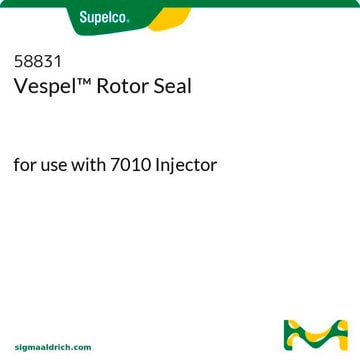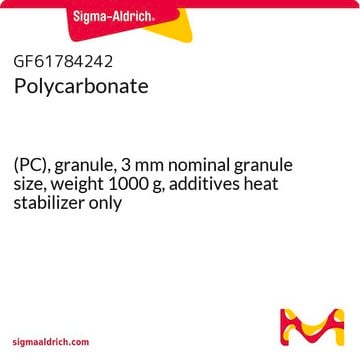81367
Polyurethane
Selectophore™
Iniciar sesiónpara Ver la Fijación de precios por contrato y de la organización
About This Item
Productos recomendados
General description
Polyurethanes are a broad class of polymers which have urethane group (-NHCO-O-). Urethane group is formed by isocyanate reacting with hydroxyl groups.
Visit our Sensor Applications portal to learn more.
Application
Polymeric membrane material for chemosensors and biosensors
Polyurethane was used as an outer coating membrane to increase stability and the linear range of the sensor during development of glutamate microbiosensor. It may also be suitable in investigating the thermal degradation of α,γ-diphenyl alkyl allophanates and carbanilates for crosslinking sites using pyrolysis-high-resolution gas chromatography/FT-IR (Py-HRGC/FT-IR).
Other Notes
Membrane material with favourable properties for sensors, e.g. long-term electrochemical stability, improved biocompatibility, etc.
Legal Information
Selectophore is a trademark of Merck KGaA, Darmstadt, Germany
Storage Class
11 - Combustible Solids
wgk_germany
WGK 3
flash_point_f
Not applicable
flash_point_c
Not applicable
ppe
Eyeshields, Gloves, type N95 (US)
Elija entre una de las versiones más recientes:
Certificados de análisis (COA)
Lot/Batch Number
¿No ve la versión correcta?
Si necesita una versión concreta, puede buscar un certificado específico por el número de lote.
¿Ya tiene este producto?
Encuentre la documentación para los productos que ha comprado recientemente en la Biblioteca de documentos.
Los clientes también vieron
S Y Yun et al.
Analytical chemistry, 69(5), 868-873 (1997-03-01)
Potentiometric responses of polyurethane (PU)-based membranes containing valinomycin and varying amounts of plasticizer (DOA) and/or lipophilic additive (KTpClPB) were examined as a function of soft segment [poly(tetramethylene ether glycol)] contents in aromatic diisocyanate-based PU matrices. Upon increasing the weight percentages
M.E. Meyerhoff et al.
Polym. Mater. Sci. Eng., 64, 293-293 (1991)
Polyurethane elastomers.
Petrovic, Zoran S., and James Ferguson.
Progress in Polymer Science, 16, 695-836 (1991)
Thermal degradation mechanism of a, ?-diphenyl alkyl allophanate as a model polyurethane by pyrolysis-high-resolution gas chromatography/FT-IR.
Yoshitake, Norimichi, and Mutsuhisa Furukawa.
Journal of Analytical and Applied Pyrolysis, 33, 269-281 (1995)
E. Lindner et al.
Electroanalysis, 7, 864-864 (1995)
Nuestro equipo de científicos tiene experiencia en todas las áreas de investigación: Ciencias de la vida, Ciencia de los materiales, Síntesis química, Cromatografía, Analítica y muchas otras.
Póngase en contacto con el Servicio técnico



![Poly[4,4′-methylenebis(phenyl isocyanate)-alt-1,4-butanediol/di(propylene glycol)/polycaprolactone] pellets, MDI-polyester/polyether polyurethane.](/deepweb/assets/sigmaaldrich/product/structures/661/697/b23c24ce-15fb-4eae-a30f-786921d4c91e/640/b23c24ce-15fb-4eae-a30f-786921d4c91e.png)







